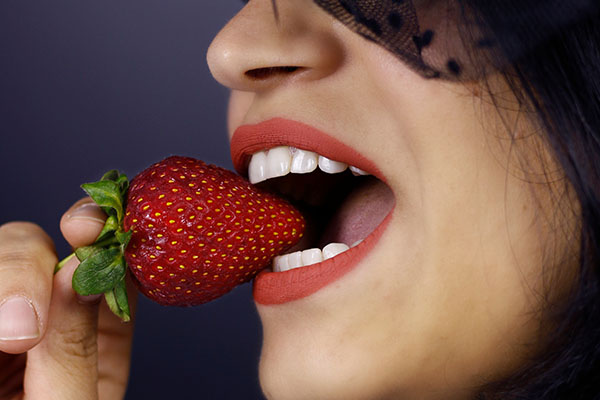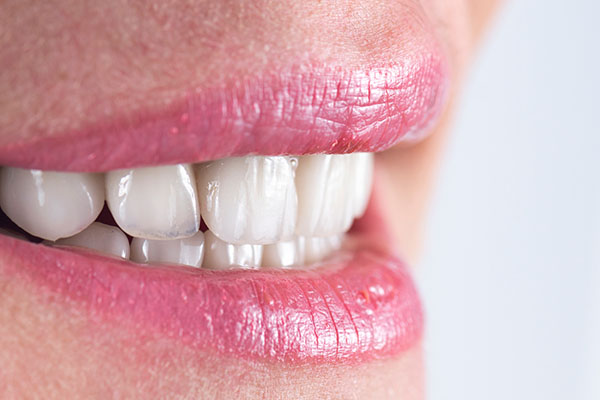 For those who suffer from damaged teeth, veneers can offer a natural-looking, long-lasting option to restore a beautiful and healthy smile. However, patients with these dental restorations should take extra care to protect them. Some dietary changes may be necessary for complete care.
For those who suffer from damaged teeth, veneers can offer a natural-looking, long-lasting option to restore a beautiful and healthy smile. However, patients with these dental restorations should take extra care to protect them. Some dietary changes may be necessary for complete care.
Foods and beverages that can damage veneers
Most foods that are unhealthy for natural teeth are also unhealthy for veneers. However, even some healthy choices require extra care, preparation, or moderation for those with this type of dental work.
Hard, crunchy foods
Anything that places excessive pressure on veneers can cause damage to the surface or bond. Biting directly into hard or crunchy foods can lead to damage, especially if it happens on a regular basis. Patients should take care when eating certain types of foods, including:
- Carrots
- Whole apples
- Corn on the cob
- Extra-crunchy chips, such as corn or kettle-cooked
- Hard candies
When possible, cut fruits and veggies into smaller pieces and chew on the side when eating crunchier foods. Hard candies are not good for overall dental health and should be avoided altogether.
Tough, chewy foods
Foods that are tough or hard to chew can also be risky. These items can become lodged between teeth and along the gum line, creating more opportunities for bacteria and decay. Thick-crusted breads, tough cuts of meat, jerky, dried fruits, and sticky candies can also loosen veneers, which will then require prompt repair or replacement.
Alcohol
Studies have shown that excessive alcohol consumption can hamper saliva production and increase the risks for oral cancer. In addition, alcohol can lessen the strength of the adhesives used to hold veneers in place. Along with limiting the number of alcoholic beverages consumed, patients should also avoid using alcohol-based mouth rinses, as these can have the same weakening effect.
Dark or acidic foods and beverages
Veneers are susceptible to staining. However, traditional whitening treatments are not effective or safe for these restorations. Therefore, patients should avoid or limit choices known to cause stains, including coffee, tea, soft drinks, and red wine. Highly acidic foods and drinks can also affect the look and strength of the veneer material. Rinse the mouth or brush right away after consuming these kinds of items, such as citrus fruits and tomatoes.
Other habits to avoid with veneers
As well as dietary choices impacting the appearance and longevity of veneers, some poor practices can be just as harmful. Crunching down on cold ice is an unhealthy habit for all patients, but especially those who wear veneers. Just like eating crunchy foods, this habit can damage the porcelain and wear down the bonding agent. Any type of tobacco use can lead to unsightly staining, deterioration, and higher cancer risks. Opening packages or pulling apart objects with the teeth is incredibly dangerous and can easily cause a dental emergency. Finally, poor oral hygiene practices can impair the look and durability of veneers.
Conclusion
Small dietary and lifestyle changes can make a large impact on the look and lifespan of dental veneers. In addition to these tips, patients should follow all instructions from the dentist for lasting results.
Request an appointment or call Davis & Dingle Family Dentistry at 803-567-1804 for an appointment in our Columbia office.
Recent Posts
Dental veneers are common restorations that are used to change the size, shape, or color of teeth. These can be made of porcelain or resin and are most commonly used on the front teeth. When these restorations are placed, there is a margin between the tooth and the porcelain or resin material. This can leave…
There are numerous cosmetic procedures to improve someone’s smile, and veneers are a popular option. There are two types of veneers: Porcelain and composite. Both are used for minor cosmetic issues such as discolored teeth, cracks or chips, gaps between teeth, and worn-down enamel.Porcelain is used more often as there are numerous benefits, but this…
Thin, tooth-colored shells called veneers can be attached to the front of individual teeth to cover up imperfections or cracks. Used for both oral health and cosmetic purposes, patients often opt for this form of restoration to vastly improve a smile. Some people wonder if the shells can go a step further and also help…


